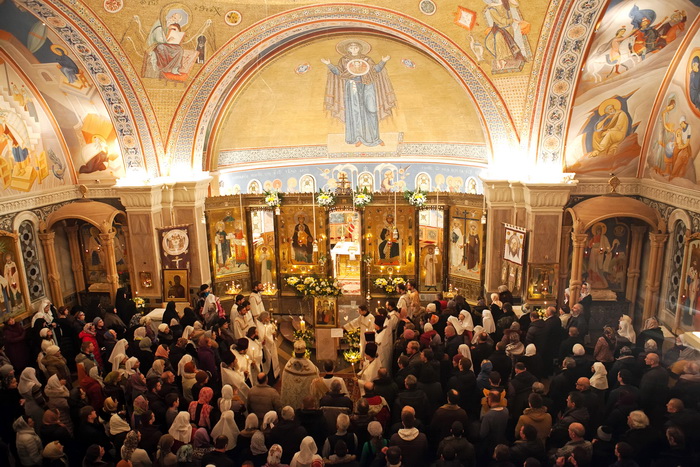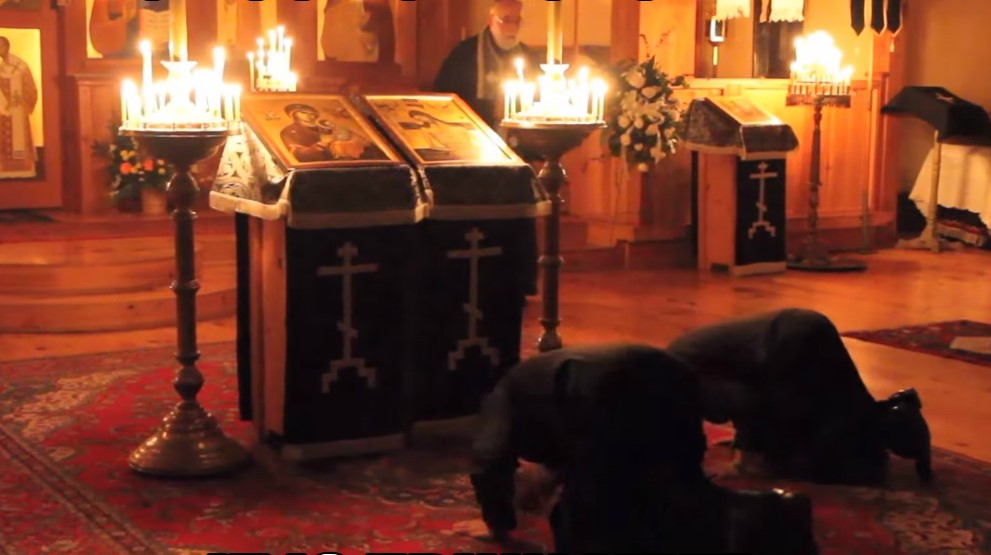The Orthodox Practice of Standing for Worship
Standing before God has been the only acceptable posture for Orthodox Christians from the earliest of times. We recognize that a faithful servant would never sit before his master, for the faithful are all servants of the Lord, whom we worship as we stand in our temples. The Holy Apostle Paul tells us, “Watch ye, stand fast in the faith” (I Cor. 16:13); “Stand, therefore, having your loins girt about with truth (Ephesians 6:14).
As Christians we must always be on guard spiritually, ever more so then when attending the divine services. By standing we subject our bodies to the attention needed to properly and fully worship God with all our mind and soul. We subject ourselves before the Master as His humble servants, being attentive to our God. When we become fatigued during long services we symbolically become offerings to the very God we worship. Saint Paul says: “Present your bodies a living sacrifice, holy, acceptable unto God, which is your reasonable service” (Romans 12:1).
In addition to the ascetic practice of standing in worship, we Orthodox can also add the pious act of prostrations. Prostrations can be done when entering the nave from the narthex, before venerating an icon in the temple, or when saying the Jesus Prayer in the privacy of our home. There are times to sit (cf. the Kathismata: the sections of the Psalter read each day: Kathisma means “seated”), and not to sit (the Akathistos: not seated!
Monks commonly perform prostrations while saying the Jesus Prayer, especially when fingering the beads that are spaced throughout one’s prayer rope. Prostrations, like standing, help aid in purifying the heart, for in doing so we bring the mind’s attention back from wandering, and worship God with body and soul united.
With love in Christ,
Abbot Tryphon
Wednesday August 11, 2021 / July 29, 2021
8th Week after Pentecost. Tone six.
Fast. By Monastic Charter: Strict Fast (Bread, Vegetables, Fruits)
Martyr Callinicus of Gangra in Asia Minor (250).
New Hieromartyrs Venerables Seraphim (Bogoslovsky) and Theognost (1921).
New Hieromartyr Anatole (1930-1935).
New Hieromartyr Alexis priest, and Martyr Pachomius (1938).
Venerables Constantine and Cosmas, abbots of Kosinsk (Pskov) (13th c.).
Martyr Daniel of Cherkassk (1776).
Virgin-martyr Seraphima (Serapia) of Antioch (2nd c.).
Martyr Theodota and her three sons, in Bithynia (304).
St. Lupus the Confessor, bishop of Troyes (479).
Martyr Michael (9th c.).
Martyr Eustathius of Mtskheta in Georgia (589) (Georgia).
St. Constantine, patriarch of Constantinople (676).
The Nativity of St. Nicholas the Wonderworker from Myra in Lycia (4th c.)
Venerable Romanus, abbot of Kirzhach (1392), disciple of St. Sergius of Radonezh.
Translation of Velikoretsky Icon of St. Nicholas the Wonderworker from Viatka to Moscow (1555).
St. Theodosius the New, emperor (450).
Martyr Mamas in Darii.
St. Olaf, king of Norway (1030) (Celtic & British).
Martyrs Benjamin and Berius of Constantinople (Greek).
Martyr Basiliscus the Elder (Greek).
Hieromartyr Bessarion of Smolyan, Bulgaria (1670).
The Scripture Readings
1 Corinthians 10:12-22
12 Therefore let him who thinks he stands take heed lest he fall. 13 No temptation has overtaken you except such as is common to man; but God is faithful, who will not allow you to be tempted beyond what you are able, but with the temptation will also make the way of escape, that you may be able to bear it.
Flee from Idolatry
14 Therefore, my beloved, flee from idolatry. 15 I speak as to wise men; judge for yourselves what I say. 16 The cup of blessing which we bless, is it not the communion of the blood of Christ? The bread which we break, is it not the communion of the body of Christ? 17 For we, though many, are one bread and one body; for we all partake of that one bread.
18 Observe Israel after the flesh: Are not those who eat of the sacrifices partakers of the altar? 19 What am I saying then? That an idol is anything, or what is offered to idols is anything? 20 Rather, that the things which the Gentiles sacrifice they sacrifice to demons and not to God, and I do not want you to have fellowship with demons. 21 You cannot drink the cup of the Lord and the cup of demons; you cannot partake of the Lord’s table and of the table of demons. 22 Or do we provoke the Lord to jealousy? Are we stronger than He?
Matthew 16:20-24
20 Then He commanded His disciples that they should tell no one that He was Jesus the Christ.
Jesus Predicts His Death and Resurrection
21 From that time Jesus began to show to His disciples that He must go to Jerusalem, and suffer many things from the elders and chief priests and scribes, and be killed, and be raised the third day.
22 Then Peter took Him aside and began to rebuke Him, saying, “Far be it from You, Lord; this shall not happen to You!”
23 But He turned and said to Peter, “Get behind Me, Satan! You are an offense to Me, for you are not mindful of the things of God, but the things of men.”
Take Up the Cross and Follow Him
24 Then Jesus said to His disciples, “If anyone desires to come after Me, let him deny himself, and take up his cross, and follow Me.



For health reasons I can’t attend church. For health reasons I can’t stand for more than a minute. For health reasons I can’t knee at all. For health reasons I can only sit.
At 75 yrs old with permanent disabilities and subject because of my immune system to Covid19 it appears I am not sure when I will go to church.
Michael,
The Church has always made exceptions for individuals who must sit. I sometimes am forced to attend our monastic services while sitting in the altar, while Hieromonk Paul serves, all because of my arthritis. So, even though I wrote of the Church’s tradition of standing for worship, I personally know there are some who simply must sit. The Church understands, but best of all, God understands.
With love and blessings,
Abbot Tryphon